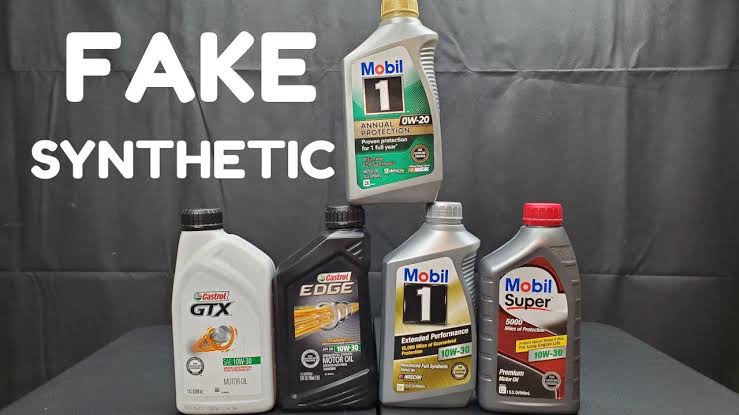Godwin Anyebe of ConsumerAssembly, Adetunji Faleye of BrandImpact and Amechi Obiakpu of Espi News, all of MediaConsortium take a look at the devastating effects of adulterated lubricants, otherwise known as engine oil in the nation’s oil and gas industry. Excepts:
The adverse effects of fake and adulterated products in any economy could be suicidal. In Nigeria consumers are every now and again exposed to adulterated and substandard products which more often than not affect their health, the environment and the nation at large.
In fact, the menace is pervasive in almost every sector of the economy from fast moving consumers goods (FMCG) to electronics, among others. The effects are quite devastating on the economy and the lives of Nigerians. Recent investigations have shown many havocs fake and adulterated lubricants, know as engine oil have cause motor owners across the country.
The Nigerian lubricants market is filled with fake and sub-standard products which in turn place a burden of excess spending on the ignorant populace due to constant break-down of vehicles and intermittent servicing of car engines.
In fact, check by MediaConsortium revealed that, Nigeria’s economy loses over N200 billion annually due to influx of adulterated lubricants when putting into consideration that most people patronise road side engine oil dealers.
Aside from the unhindered importation of fake lubricants into the largest market in Africa, analysts are of the view that some criminal elements refill branded engine oil containers with substances, and subsequently sell the same to unsuspecting citizens for almost the same price as the original product.
This development is frustrating genuine manufacturers of engine oil in Nigeria as a good number of them are feeling the pains of adulterated lubricants wrestling the market share with their products. The continued unhealthy practice of selling fake engine oil to Nigerians has made many Nigerians to question the efficacy of regulatory agencies in the country.
Such activities have indeed led to loss of revenue to the original or genuine products dealers through low sales occasioned in turn, with the influx of fake engine oil into the country. The situation sometimes degenerates into low productivity and resultant lay-offs in most manufacturing firms of original lubricants.
Interestingly, federal government through its regulatory agencies have been doing their best to nip this problem in the bud. For instance, in 2021, the Federal High Court in Lagos ordered the remand of two businessmen, Vanger Luper and Bright Ogbuagu, at the correctional centre in Ikoyi, Lagos State for allegedly adulterating automobile engine oil.
The Standards Organisation of Nigeria (SON) arraigned them on a five-count charge of dealing in substandard engine oil and fraudulently claiming they were genuine products.
Prosecuting counsel, Adeleke Olofindare, said Luper, of 27, Bale Street, Onireke, Ojo, and Ogbuagu of 5, Okoye Street, Igbeniri, Ojo, conspired to commit the alleged offence on December 23, 2020, at the United Allied Spare Parts Dealers Association (UASPDA), Trade Fair Complex, on the Lagos-Badagry Expressway.
They were alleged to have produced fake Total, Mobil, Forte Oil and AMMASCO engine lubricants and placed forged labels on them to deceive unsuspecting buyers.
According to SON, the defendants “did fraudulently inscribe SON marks of quality, certification number and logo on the adulterated/substandard engine oil to deceive innocent consumers.”
The agency said they adulterated 29 cartons of AMMASCO engine oil, 24 cartons of Mobil Oil, 18 cartons of Forte Oil, two cartons of Total Oil, two cartons of A-Z Oil (one litre each) and one carton of 4-litre Forte Oil.
Also found in their possession were 5X25 litres of unbranded engine oil and 18X25 litres of unbranded empty jerry cans. The alleged offence is punishable under Section 26 (a) and (b) of Standards Organisation of Nigeria (SON) Act 2015.
Despite these moves, the DPR recently discovered an illegal factory in Niger State where the packaging of adulterated lubricants was being carried out. The illegal factory packaging adulterated lubricants in Usuba Village, near Kontagora in Niger was operated by IMN Auto parts and had about 40 persons, mostly women working for them. The workers were not equipped with any safety clothing or measures to protect them from the dangers they were being exposed to.
In 2010, the DPR had raised the alarm over widespread substandard lubricants in the Nigerian market. This had prompted it to start implementing a zero-tolerance policy to rein in producers, distributors, agents and traders of adulterated lubricants.
Besides, the department stepped up supervision of base oils importation in the attempt to ensure that only licensed lubricant blenders and not roadside vendors package and dispense them.
In addition, in 2020, SON sealed a plaza at the Auto Spare Parts and Machineries Dealers Association (ASPAMDA) market, Lagos Trade Fair Complex, over adulteration of established engine oil.
SON said that the move was to guard against prevalence of motor accidents and machine breakdown, particularly during the Yuletide resulting from the use of the adulterated lubricants.
In the month of August, 2021, a team of the Surveillance Investigation and Monitoring (SIM) unit of Standard Organization of Nigeria (SON) reportedly uncovered a lubricant adulterating syndicate at mini mart along Gidan Mada area of Sokoto State.
That investigation led to the arrest of a primary suspect who was found at the premise with various litres of adulterated mobile and Amasco engine oil. Though, the name of the suspect was not given but, was said to be a manager of Na’ada company a dealer of engine oil.
Although action like this is one among many aimed at discouraging the fake lubricant dealers. However, despite many arrests, deviant Nigerians have persisted to indulge in adulterated engine oil and selling to unsuspecting Nigerians destroying quite a number of machinery and engines.
Adulteration of lubricants causes irreparable damage to engines, such as sudden failure, difficulty in starting, increased fuel consumption, low fuel spraying rate in the combustion chamber, and increased emissions of particulate matter.
Investigation carried out by the Intelligent Unit of MediaConsurtium revealed that, despite the collateral effects of fake lubricants, more Nigerians are increasingly patronising fake and adulterated lubricants.
For instance, Olajide Damilare, a lubricant marketer with Imperial lubes and chemicals ltd, marketers of Viva Oil in Lagos told MediaConsurtium that, “proliferation of roadside oil marketers results from heavy patronages of the commodity, noting that, what the roadside sellers trade on is base oil which lack the adequate properties of a branded oil.
Composition of standard lubricants
According to him, “lubricant is made from two major components, the base oil and the additives. The base oil is like the major component that takes like the 80/90% of the total component. The base oil can also be divided into two- the mineral base oil and the synthetic base oil.”
Continuing, he pointed out that, “the mineral base oil is derived from the crude oil after the various component from the crude have been separated – petrol, diesel, Kerozine etc. The synthetic base oil is manufactured in the laboratory. Because it is manufactured in the lab, it is purer than the one from the crude oil (mineral base oil) and it has the capacity to do more because it is what you need that you will put in the component to form the synthetic base oil.” He noted.
“Apart from the base oil you have additives. Additives are the extra element you put to the base oil to get the right standard oil for the engine. They perform different functions, part of the function is detergent seer- washes the engine to keep it free from blockages, coolant, to cool the heat generated in action. Dispasat see, to break the engine oil and becomes black after use.” He added.
He stated, “engine oil is limited to engine while lubricant comprises all including the engine oil. There are some requirements engine need to function perfectly. Because during functioning, a lot of activities take place- when an engine oil does not contain the right amount of additives, it can damage the engine.
“That is why the roadside lubricants or oil don’t contain additives and are dangerous to the engine. Its use may not damage the engine immediately, but, its postponing the evil day,” he noted.
Further findings by MediaConsortium also revealed that, roadside oil marketers are only selling base oil which does not contain additives. Additives are very expensive however, they play good role to maintain engine of a car.
However, not every branded or sealed engine oil is good or can give good value to cars. It depends on the process and the quality level. There are two major classifications of an engine oil. Sotai Automotive of Engineer (SAE). They determine the viscosity of lubricant that is even when you check the OEM, you will be told what level of oil to use.
Sadly, in Nigeria consumers are usually not bothered by some of these recommendations- due to paucity of fund.
MediaConsortium also find out that, after production of any oil, the manufacturers take it to SAE for certification- which leads to the different viscosity level- like the SAE 40, SAE 50 and the like. SAE would have taken it to their laboratory to get to viscosity level.
There is monograde and the multigrade types of SAE. The SAE 40, 50 or 30 are monograde but SAE 20W50, SAE0W20 are multigrade, it means, they function between two viscosity level. From 0 to 20 among others.
Another classification is the API, after dealing with the SAE that talks about the viscosity which in the lay man is the thickness of the oil. While some people say that oil is not different, others say the thicker the oil the more effectiveness it will have. This has been found to be untrue. It is a factor of what the engine wants.
It’s important to note that, on the cap of every engine are specification of the type of engine oil to be used. But, ignorantly people don’t pay attention to these details—which ultimately causes damage to the vehicle- when you put an oil that is too thick for an engine it gives that engine too much work to process. The engine will over work to generate enough heat.
MediaConsortium also discovered that, roadside mechanics are not helping matters. The reason consumers must ensure they buy lubricants that are branded and original themselves, and desist from buying from over 100 brands of adulterated lubricants in the country, and among other fake products imported illegally into the country.
Conclusion
Aside, many oil manufacturers are dubious in their claim on the brand specifications either with the SAE and API after the products fail meeting the standard in the laboratory. Originally, they need to take the base oil to the lab and add the additives and other elements to make it a complete whole.
Although Federal Government agencies and stakeholders in the industry have been working on new strategies and tactics to nip in the bud circulation of fake and adulterated lubricants, consumers of these brands also have the responsibly to patronise certified and original brands to avoid causing trouble to their vehicles.









